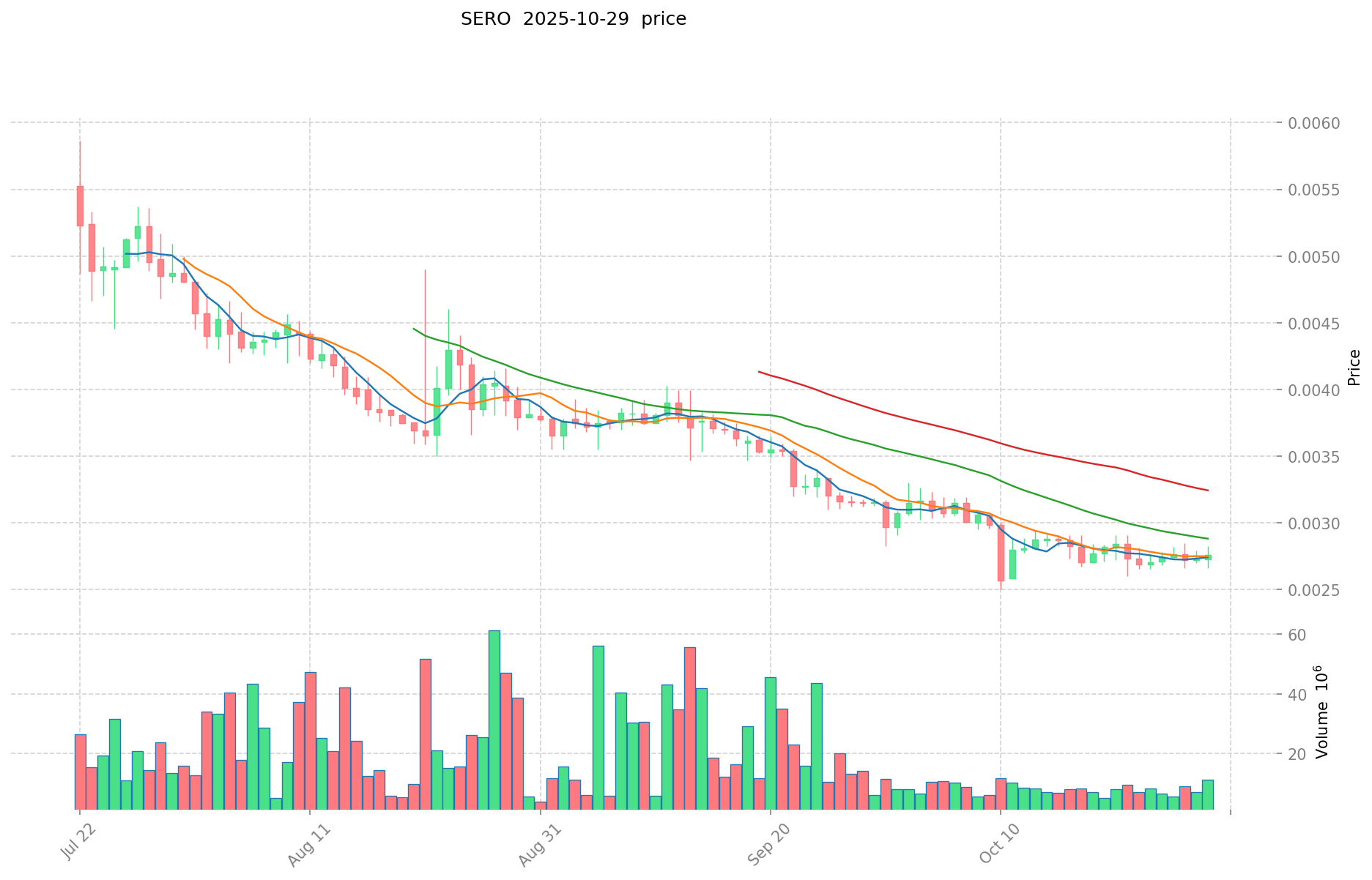What is SERO: Understanding the Privacy-Focused Cryptocurrency Platform
Sero's Positioning and Significance
In 2019, the creators launched Sero (SERO), aiming to address privacy concerns in blockchain transactions and smart contracts. As a privacy-focused digital currency platform supporting Turing-complete smart contracts, Sero plays a crucial role in the field of privacy protection for decentralized applications.
As of 2025, Sero has become a significant player in the privacy-focused blockchain sector, with 11,206 holders and an active developer community. This article will analyze its technical architecture, market performance, and future potential.
Origin and Development History
Birth Background
Sero was created in 2019 to solve the problem of privacy protection in blockchain transactions and smart contracts. It was born during the blockchain technology boom, aiming to enable decentralized applications to have privacy protection functions while allowing for commercialization of blockchain technology without leaking sensitive business information.
Sero's launch brought new possibilities for developers and users seeking privacy in blockchain applications.
Important Milestones
- 2019: Mainnet launch, achieving privacy protection for smart contracts.
- 2019: Price reached an all-time high of $0.55192 on July 6.
- 2025: The number of holders reached 11,206, showing growing adoption.
With the support of its community and development team, Sero continues to optimize its technology, security, and real-world applications.
How Does Sero Work?
No Central Control
Sero operates on a decentralized network of computers (nodes) spread across the globe, free from control by banks or governments. These nodes collaborate to verify transactions, ensuring system transparency and attack resistance, giving users greater autonomy and enhancing network resilience.
Blockchain Core
Sero's blockchain is a public, immutable digital ledger that records every transaction. Transactions are grouped into blocks and linked through cryptographic hashes to form a secure chain. Anyone can view the records, establishing trust without intermediaries.
Ensuring Fairness
Sero uses a consensus mechanism to validate transactions and prevent fraudulent behaviors such as double-spending. Participants maintain network security through activities like computing or running nodes and receive Sero rewards. Its innovative features include privacy protection for smart contracts.
Secure Transactions
Sero uses public-private key encryption technology to protect transactions:
- Private keys (like secret passwords) are used to sign transactions
- Public keys (like account numbers) are used to verify ownership
This mechanism ensures fund security while keeping transactions private. Sero also supports anonymous digital assets and can save complex data structures with privacy needs.
SERO's Market Performance
Circulation Overview
As of October 29, 2025, SERO's circulating supply is 442,711,623 tokens, with a total supply of 650,000,000.
Price Fluctuations
SERO reached its all-time high of $0.55192 on July 6, 2019.
Its lowest price was $0.0025106, occurring on October 11, 2025.
These fluctuations reflect market sentiment, adoption trends, and external factors.
Click to view the current SERO market price

On-chain Metrics
- Daily Transaction Volume: $32,063.97 (indicating network activity)
- Active Addresses: 11,206 (reflecting user engagement)
SERO Ecosystem Applications and Partnerships
Core Use Cases
SERO's ecosystem supports various applications:
- Privacy Protection: SERO allows developers to publish anonymous digital assets, enabling decentralized applications with privacy protection features.
- Smart Contracts: SERO supports Turing-complete smart contracts with privacy features.
Strategic Cooperations
SERO has established partnerships to enhance its technological capabilities and market influence. These partnerships provide a solid foundation for SERO's ecosystem expansion.
Controversies and Challenges
SERO faces the following challenges:
- Technical Challenges: Balancing privacy features with scalability and performance.
- Regulatory Risks: Potential scrutiny due to its privacy-focused nature.
- Competitive Pressure: Competition from other privacy-focused blockchain projects.
These issues have sparked discussions within the community and market, driving continuous innovation for SERO.
SERO Community and Social Media Atmosphere
Fan Enthusiasm
SERO's community shows vitality, with 11,206 holders as of the latest data. On X platform, posts and hashtags related to SERO occasionally gain traction.
Social Media Sentiment
Sentiment on X appears mixed:
- Supporters praise SERO's privacy features and smart contract capabilities.
- Critics may focus on issues such as price volatility or regulatory concerns.
Recent trends show a challenging market sentiment, with the price significantly down from its all-time high.
Hot Topics
X users discuss SERO's privacy features, smart contract capabilities, and its potential in the blockchain industry.
More Information Sources for SERO
- Official Website: Visit SERO's official website for features, use cases, and latest updates.
- X Updates: On X platform, SERO uses @SEROdotCASH, covering topics such as technical upgrades and community activities.
SERO Future Roadmap
- Ecosystem Goals: Expand the use of anonymous digital assets and privacy-protected smart contracts.
- Long-term Vision: Become a leading platform for privacy-focused blockchain applications.
How to Participate in SERO?
- Purchase Channels: Buy SERO on Gate.com
- Storage Solutions: Use compatible wallets for secure storage
- Participate in Governance: Stay tuned for community decision-making processes
- Build the Ecosystem: Visit SERO's GitHub repository to contribute code or develop applications
Summary
SERO redefines digital currency through blockchain technology, offering privacy protection and smart contract capabilities. Its active community and unique features make it stand out in the cryptocurrency field. Despite facing challenges such as regulatory concerns and market volatility, SERO's innovative spirit and focus on privacy position it as an interesting project in the decentralized technology landscape. Whether you're a newcomer or an experienced player, SERO is worth watching and participating in.
FAQ
What is sero in medical terms?
Sero in medical terms refers to blood serum. It's often used in the context of antibody presence, as in seroconversion after viral infection.
What does it mean if someone is seropositive?
Being seropositive means having antibodies in the blood, indicating exposure to a specific pathogen. It's confirmed by a positive blood test result.
What is the meaning of seros?
Seros is a prefix indicating a connection to serum, often used in scientific contexts to describe something related to or derived from serum.
What is sero diagnosis?
Sero diagnosis detects antibodies in blood to identify infections, confirming pathogens through increased antibody levels or virus-specific IgM antibodies.
Share
Content